2025 has been a year of trying to get back into a regular reading habit. That has also included changing how I read books. I’ve always been good about highlighting or underlining in my books, but that’s usually the extent of my interaction with a book. Once I’m done reading, it goes on a shelf, to maybe get picked up again at some point. I wanted to change that. So now, along with highlighting, I am taking notes as I read and putting the author’s thoughts into my own words. This allows me to internalize what I’m reading, as well as creating the added benefit of connecting ideas from one book to another, or something entirely random (I’ll share more on how I do that in the future). While it’s more work, it’s made reading more fun.
So with all that in mind, I wanted to share some of my favorite reads thus far in 2025 and why I think you should consider adding them to your library.
My Favorite Reads of 2025 (So Far)
Digital Dharma by Deepak Chopra
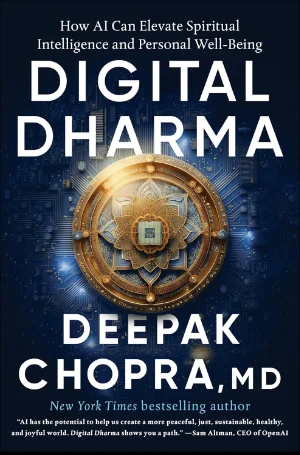
Deepak Chopra is a name I had heard many times, but I never thought to pick up any of his books. As a Christian, it was a name I stayed away from, for whatever reason. It was only after listening to an interview he did on Mayim Bialik’s Breakdown podcast that I became curious enough to read one of his works. The title in question is his most recent release titled Digital Dharma.
Digital Dharma is about using AI tools such as ChatGPT, Gemini, and others as a sort of digital guru to help with one’s spiritual journey along the dharmic path. AI can become an accelerant to spiritual growth because of its vast access to a wealth of data and ever-present accessibility, which is in contrast to people who are not always available or can prove judgmental. When used in this capacity, AI has the ability to both elevate and enhance our well-being. Ultimately, it’s about raising one’s perceptivity to self-awareness so they can increase their dharmic state.
I found Digital Dharma to be an enjoyable read, even though I already use tools like ChatGPT for this purpose. Even though the concept of using AI for spiritual and personal growth wasn’t new to me, it has enhanced my ability to use it for such purposes. Where I found the book most valuable is: 1) introducing me to [[Deepak Chopra]] and his works, and 2) giving me a better understanding of other religious and spiritual worldviews, such as Indian Vedic spirituality. Those are areas I will explore in more detail in the future, such as reading texts like the Bhagavad Gita.
Overall, this is a book I will recommend to many who want to deepen their own self-awareness and grow in their spirituality. There are so many people who are hesitant to use AI because they don’t understand it, or are only using it in a narrow capacity, such as for business. Yet, Digital Dharma has the potential of opening up a new world for those who are willing to tap into what AI has to offer on a more personal level.
I Don’t Believe in Astrology by Debra Silverman
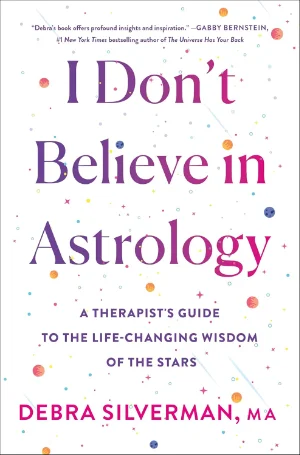
Next up is I Don’t Believe in Astrology by Debra Silverman. I don’t remember how I came across this book. If I’m honest, it might have been through constantly showing up in my social media ads. After jumping into Human Design a couple of years ago, I wanted to learn more about astrology, so this book seemed like a good introduction to the subject.
I Don’t Believe in Astrology teaches the basics of astrology for newcomers. Unlike most astrologers, Debra goes beyond the basics and also taps into the esoteric side. She is able to do this and make those necessary connections because of her background as a psychotherapist and seeing how these bring about true life change. The first half of the book is all about teaching the basics of astrology so the reader has a basic understanding and working vocabulary. The second half of the book focuses on breaking down each of the twelve signs and how to understand it in its given placement (i.e. sun, moon, Saturn, low/high road, etc.). At its heart, this book is designed to prepare you to live in the Aquarian age and to give you the blueprint for living a more soul-connected life.
While I found some of the language a bit abrasive, this was a book I thoroughly enjoyed. I walked away knowing very little about astrology to at least having a more rudimentary understanding. By no means will this book make you an expert, but it’ll at least give you enough to get started and learn more, which you can do by signing up for one of Debra’s courses (which it seems most books are designed to do these days).
Many Lives, Many Masters & Messages from the Masters by Brian Weiss
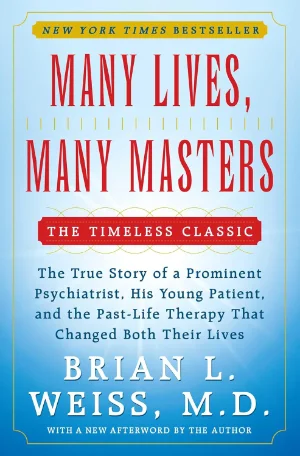
I was introduced to Many Lives, Many Masters by my good friend, Nicole Spencer. We were chatting one day about the many books she was reading & she mentioned this one. I hadn’t given much thought to the subject matter, but it intrigued me. That prompted her to gift it to me for my birthday (along with another mentioned below).
Many Lives, Many Masters is authored by psychiatrist Brian Weiss and is the true account of his work using past-life therapy with a young woman to cure her many ailments. Throughout the course of his work with this patient, he learns that she had experienced over 80 previous lives, and as they encountered each one, her many ailments began to remedy themselves, never to be experienced again. And during some of these past-life sessions, Dr. Weiss would receive messages from higher beings called “masters” that shared with him important truths about life.
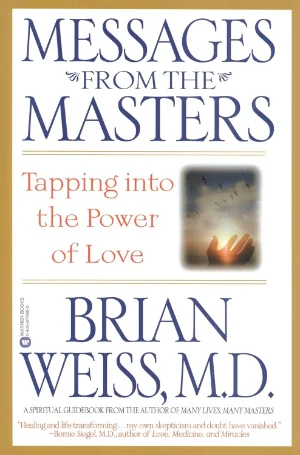
The next book, Messages from the Masters is one of the sequels to Many Lives, Many Masters. It explores the soul’s journey through lifetimes, emphasizing that love is the ultimate lesson and healing force. Weiss reveals how our relationships, challenges, and choices are part of a divine plan we co-create to grow in love, compassion, and inner peace. The book invites us to remember our spiritual nature, release fear, and live more intentionally from the heart. At its core, it teaches that enlightenment comes not from external achievement but from aligning with the timeless truth that love is who we are.
These books blew my mind. I finished reading Many Lives, Many Masters over the course of a few evenings, and immediately sought out Messages from the Masters. Having taken an interest in near death experiences, the thought of reincarnation & past-life therapy intrigued me, even if it did challenge my Christian beliefs at the time. I appreciated being able to wrestle with the subject, expand my awareness, and to test these claims against truth. Ultimately, I walked away from both books with a greater desire to live a life of love and to do the inner work of quieting myself to get closer to the source of love.
Sketch Your Mind by Zsolt Viczian
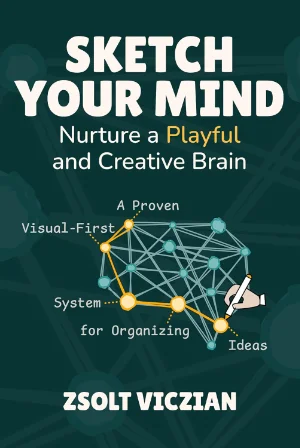
I have been in the world of Personal Knowledge Management for a handful of years. In that time I bounced back & forth between several apps, but ultimately landed on Obsidian as my notemaking app of choice. But one thing I’ve always wanted to do is learn how to create cool visuals for my notes to make them stand out. That’s where Sketch Your Mind by Zsolt Viczian comes in.
This book is all about teaching you the principles of building, what Zsolt calls, a 4D PKM. Not only are you typing out your notes, but you are turning them into connected visuals that help capture, organize, and evolve your thinking. Zsolt walks you step by step through the entire process, while giving you several methods along the way to help nurture a creative knowledge management system. And while this book is platform agnostic, it does lean toward favoring both Obsidian and the Excalidraw plugin for getting the most out of what is taught.
As someone who feels they lack creative acumen, I found this book to be quite inspiring. It showed me that I didn’t need to be an artist to create beautiful visuals out of my notes and ideas. I appreciated how each chapter in the book pushed you to immediately implement what you learned by creating your own visuals based on that chapter’s lesson. I loved the thought of learning how to “sketch my mind” so much that I ended up signing up for Zsolt’s self-paced Visual Thinking Workshop to dive deeper.
The Inner Compass by Lawrence Yeo
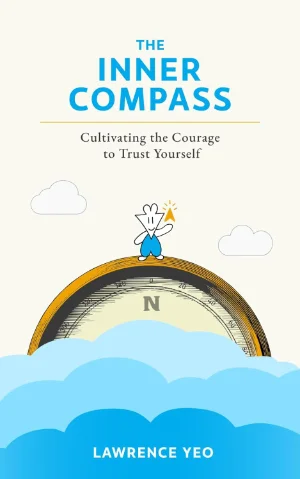
The Inner Compass by Lawrence Yeo is a guide to moving from external conditioning toward inner conviction, or self-understanding. Yeo argues that suffering arises when we outsource validation to others or compare ourselves to past and future versions of who we “should” be. True peace comes from listening to our inner compass—our intuition and conviction—rather than fear and the lure of certainty.
The path to self-understanding follows three principles: Reflect, Relate, Create. Reflection strips away conditioning through questioning and journaling. Relationships test and refine conviction by showing us who we are in community. Creation allows us to express agency and pursue mastery for its own sake, rather than status. Life becomes a continual recalibration: drifting from true north, noticing the tension, and returning through curiosity and conviction.
This book was not on my radar at all, but serendipitously came across my path. I first heard about it on Twitter when Jonathan Goodman retweeted about it. Then, not even a week later, it appeared in a newsletter from Nick Milo. So, I decided to preorder it, and I’m glad I did. It converged the ideas & concepts from several prior reads, but did so very succinctly. I appreciated how short the read was and all the visuals that came along to make key points memorable. This book really helped me solidify thoughts around meditation, Human Design, intuition, and other ideas.
Tiny Experiments by Anne-Laure Le Cunff
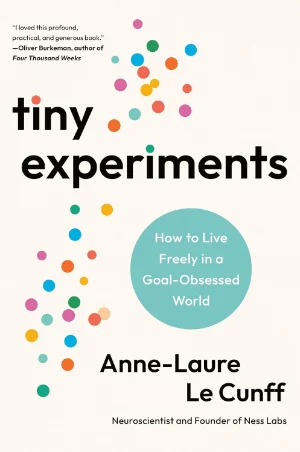
Tiny Experiments by Anne-Laure Le Cunff is a book about breaking from a life and society that is goal-oriented and dominated by hustle culture and productivity as measures of success & personal growth. It posits a different way of living through making pacts and treating them as tiny experiments in one’s life (like my personal health tiny experiment). The aim is to focus less on a linear way of thinking that is dominated by productivity and doing more to achieve, but living a life of curiosity and playfulness as the approach to one’s life. Tiny Experiments offers the reader a calmer and more thoughtful way to think about personal growth.
This book stands out because it takes a different approach to life, and one that speaks to my soul as a Manifesting Generator who likes to dabble in many things before committing to them. Books like Atomic Habits are great for creating new goals, but in many ways it can feel too rigid. Tiny Experiments brings a lighter approach with an emphasis on escaping hustle culture, instead of continually getting engulfed in it. That shift in mindset fits well with so many of the other things I’ve read and learned throughout this year.
To Shake the Sleeping Self by Jedidiah Jenkins
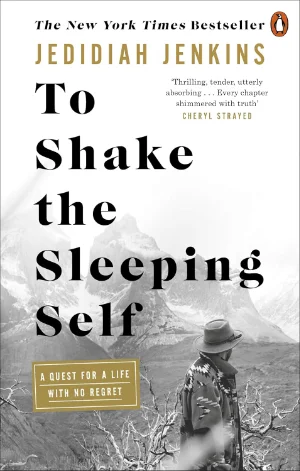
To Shake the Sleeping Self is the other book my friend Nicole gifted me for my birthday. It’s a memoir written by Jedidiah Jenkins that recounts his 14,000 mile cycling journey from Oregon to Patagonia (south Chile), a trip which he shared in real time on Instagram. It shares the epic tales and encounters he had along the way. We also become privy to the gripping questions of identity he wrestled with on this journey, such as his sexuality, Christian faith, and ultimately what it means to be an adult.
As someone who enjoys cycling, this sounded like a fun read, but I had no idea how profoundly it would impact me. Reading this memoir opened my eyes to the world in a way I didn’t think it would. Even across the barriers of language and culture, love and compassion can still take centerstage. I felt like I was on the journey with Jenkins across the Americas and it prodded me inward into my own soul’s journey and search for deeper meaning. Not only did this adventure serve as a wakeup call for Jenkins, it did the same for me.
Why We Meditate by Tsoknyi Rinpoche & Daniel Goleman
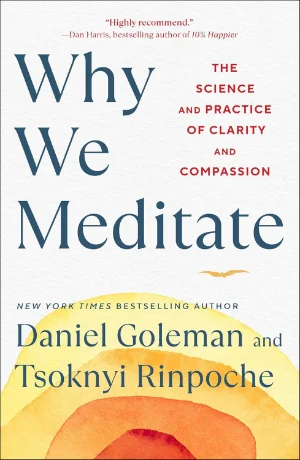
This next book was one that spoke to me while on a date night Barnes & Noble book haul. I initially saw it sitting on one of the tables as we walked into the store, heading toward of aisles of choice. It was only when Jaimie and I were heading toward the checkout that it grabbed my attention. I glanced at the synopsis and sat it back down. Jaimie sensed I had some interest, so she told me to get it if I wanted it. So, that’s what I did.
Why We Meditate by Daniel Goleman and Tsoknyi Rinpoche is a powerful exploration of meditation not just as a technique, but as a pathway to emotional healing, inner balance, and compassionate living. Blending Buddhist wisdom with modern psychology, the book teaches practical methods—like dropping into the body, calming the subtle energy through breath, and befriending our difficult emotions through [[The Handshake Practice|the Handshake Practice]]—to help us reconnect with our innate “essence love,” a quiet sense of okayness that doesn’t depend on external validation. Through mindfulness, calm-abiding, and insight, we gradually transform our relationship with thoughts, emotions, and the self, moving from ego-driven patterns toward a grounded, open, and clear way of being that empowers us to love and serve others with authenticity and resilience.
I’m glad I picked up this book because it was just the introduction I needed to the practice of meditation. Sure, I’d heard about it before and had tried it a bit on my own, but I wanted a deeper understanding. This book provided just that. Not only did it provide practical application for the how to of meditation, but it also appeased my scientific mind that wanted to understand it from that perspective & how it helps in the “real world.” This book helped me see that meditation isn’t about emptying the mind or forcing peace. It’s about showing up — consistently and compassionately — and meeting myself in the stillness. That’s a lesson I’m still learning.
Younger Next Year by Chris Crowley & Henry Lodge
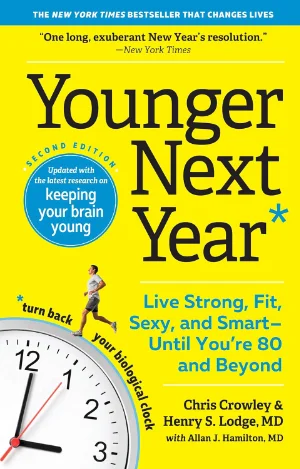
The last book on my list came to me by way of my resistance band training mentor, Dave Schmitz. Last year he recommended Dr. Peter Attia’s book Outlive to his Band Gym members. He had read it and began implementing some of the book’s principles in our training programs. Later he came across Younger Next Year by Chris Crowley & Henry Lodge, which looks at how we can use exercise to live a better life as we age.
Much like Why We Meditate, this book is written from two perspectives. The one perspective is the professional advice from a doctor whose desire is for people to inherently slow the effects of aging by living healthy lives so they can be active well into their retirement years. The second perspective is from the resident old guy who is putting the doctor’s words into practice and serves as his own case study for these principles.
As someone in my 40’s, my health is something I need to take more seriously, and this book was just what I needed to give me that perspective shift and kick in the pants. Where Outlive did a great job of providing the hard science, Younger Next Year does a better job of making it practically applicable to the average person who wants to still be active & healthy into old age. I don’t just want to live longer… I want to live better. This book helped reframe aging as an opportunity, not a decline. And it gave me a mantra to live by: Make movement my job.
Books I’m Currently Reading
Since I typically read several books at a time, here are a few I’m currently working my way through. Who knows — by the time I finish these, they might end up on the list too.
- The Three Beliefs of Ego by Aaron Abke
- The Essene Gospel of Peace
- The Extended Mind by Annie Murphy Paul
- The Man the Moment Demands by Jason Wilson
- Becoming Supernatural by Dr. Joe Dispenza
- What’s My Aura? by Mystic Michaela
- The Divorce of Israel – Volume 1 by Kenneth L. Gentry
Books I Plan to Read Soon
While there are several books I’m working through, there are plenty more that I already have in the queue as future reads. I thought I’d share some of those with you as well.
- My Big TOE trilogy by Thomas Campbell
- The Obvious Choice by Jonathan Goodman
- Quantum Wellness by Dr. Karen Parker
- Feel-Good Productivity by Ali Abdaal
- Don’t Believe Everything You Think by Joseph Nguyen
- How Jesus Became God by Bart Ehrman
So Many Good & Impactful Reads
These books weren’t just good reads — they were companions on the journey. They helped me realign with what matters: love, presence, health, and purpose. I hope one of them meets you at the exact moment you need it.
I’d love to hear about the books you’ve read and enjoyed this year. Either drop it in the comments below, or head over to the Living Room where we can discuss it more intimately.
